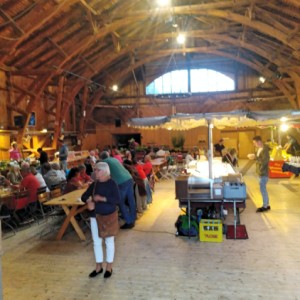Brexit field
I hate Maize (corn)
I hate Brexit
And now I even hate Sunflowers!!!!!!!!!!!!!!!
Well, at least the commercial ones which are not any better than the maize, perhaps even worse as they look so attractive but are just as poisonous. "A bit like Brexit" I hear you all shout!
I even learnt this week that five single commercial maize seeds eaten by a pheasant will kill it. And if you walk along a sown maize field you will always see some of the seeds which have not been properly covered by the drill machine. You will almost certainly see piles of seed at the points where the tractor turns or the drill hopper is filled. They are almost always pink coloured which is the highly toxic coating that "protects" the seedling and will remain in the plant until it is harvested and thus also in the food, starch and silage that it is used for. With the exception of maize used to fuel gas producing units, we humans get to enjoy the poison later whether in foodstuffs or in milk.
This is what Wiki says about Neonicotinoids which are the widest used chemicals:
"As of 2013 neonicotinoids have been used in the U.S. on about 95% of corn and canola crops, the majority of cotton, sorghum, and sugar beets and about half of all soybeans. They have been used on the vast majority of fruit and vegetables, including apples, cherries, peaches, oranges, berries, leafy greens, tomatoes, and potatoes, to cereal grains, rice, nuts, and wine grapes."
Just for clarity, I am not addressing the Monsanto/Bayer/RoundUp issue here. Simply the neonicotinoids which are a group of 7 widely used very modern insecticides, manufactured by 5 companies and with sales of some $2 billion per year. The first one was patented in 1985 but only by the late 1990s did one of them become widely used,
The chemical companies will tell you that the sudden massive rise in bee colony deaths in the late 1990's has absolutely nothing to do with their products. And the much higher incident of bee deaths in arable areas compared to meadowland is pure hearsay.
The EU finally banned three of the neonicotinoids this April to the great joy of the Greens and the beekeepers. But now it has come out that there is a paragraph buried in the text of some EU paperwork which allows "Exceptions" to such bans. In the last few years, Germany has been granted two, the UK three and Romania twenty. On Wednesday Bavarian TV showed a documentary on the subject and specifically the horrendous bee colony death rate in Romania, traditionally one of the biggest European beekeeping nations and indeed now the biggest supplier of honey in the EU.
They show the plight of a well educated (Agriculture degree from a German university) Romanian living in the hilly, " backwards" area in the north of Romania and his fulltime work as a commercial organic beekeeper. In spring, he has his 200+ hives at home to enjoy the first blooms but then has to move them south to the massive rape, maize and sunflower fields. Here he stands no chance of producing what we expect from "organic" honey. It's all sprayed with neonicotinoids and often by air, the drift of which will also spread over the bordering Acacia forests, another major source of honey. And the spray lands in all the water pools and ponds that the bees drink from. Last year he lost 80 of his 200 hives to sudden bee deaths after the season ended.
The situation is dramatic, especially when you add in the herbicide glyphosate (RoundUp).
And as shown very well today, the wretched maize ruins the soil it is planted on. Seen a weed on a maize field? Or a worm tunnelling excavation mounds? Or does your dog search for a mouse hole?.
The roots do nothing to improve the soil structure, encourage compaction, speed up flooding and soil erosion and require high additions of nitrates which contaminate our drinking water.
And it ruins our countryside, admittedly "cultured landscape" but at least it tended to be mixed and varied. Soon the area between our village and the next village will be 100% maize. Very luckily, our house is surrounded by meadowland not suitable for maize - yet! We have our own problems with lack of wildflowers but at least I have a relatively good conscience about my honey but just like the Rumanian beekeeper I can't guarantee the girls didn't fly further afield nor what they fed on.
By the way, "Organic honey" only officially means that the beekeeper doesn't use artificial chemicals in his hive. It doesn't mean the bees only fed on organically grown plants.
Did we have sunflowers, rape, corn, cereals in my youth?
Seemingly not, according to the five manufacturers.
I think that for every sentence above you could convert it into a Brexit comparison. And the sunflowers in the photo, with their drooping heads, continue this. Were we promised gold? And now?
For the record, the flooded field scene was taken on the evening dog walk with Luna and we popped by the weekly organic market at the Dampfsäg hall with most sitting inside at the beer tables drinking a litre or two of the nowadays also neonicotinoid contaminated beer (as is most mother's breast milk in developed agricultural countries).
Only some of the children were outside enjoying the beer garden ..... playground. I Bliped the hall holding the fortnightly cinema last week. In the extra photos, one of the interior - the cooked food and drinks bar are hidden directly to the left,


Comments New comments are not currently accepted on this journal.